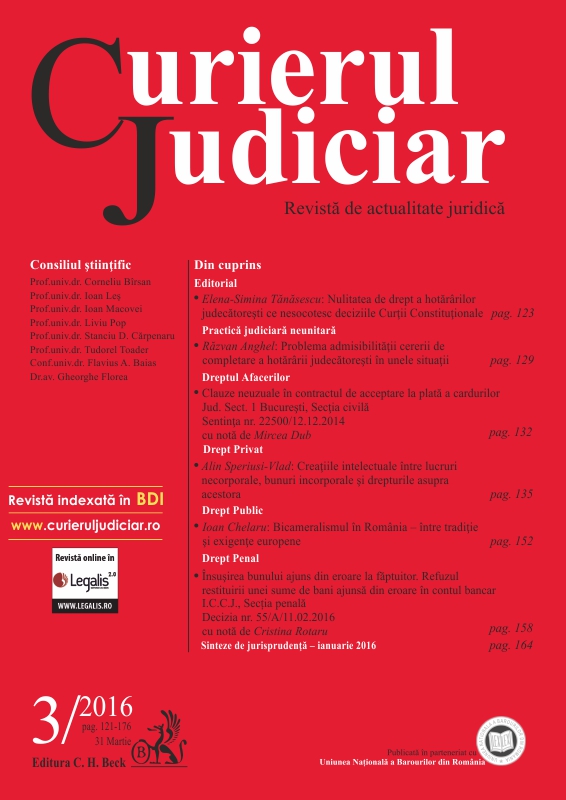Proprietatea intelectuală şi proprietatea incorporală în sistemul noului Cod civil (I): creaţiile intelectuale între lucruri necorporale, bunuri incorporale şi drepturile asupra acestora
Intellectual property and intangible property in the new Civil Code system (I): intellectual creations from intangible things, intangible assets and rights over them
Author(s): Alin Speriusi-VladSubject(s): Law, Constitution, Jurisprudence
Published by: C.H. Beck Publishing House - Romania
Keywords: intellectual property;intangible property; intellectual creation’s emergence;intellectual creation in the public domain;constitution of the real right;assimilated real estate; object;content
Summary/Abstract: Intellectual property is the best domain for studying the problematic of intangible assets and intangible things regulated by art. 535 of the Romanian New Civil Code. In this manner we can determine in which measure the intellectual creations are the intangible assets over that can be constitute patrimonial rights. The premise of art. 535 of the Romanian New Civil Code is the existence of intangible assets over that can be constitute, after their emergence, a patrimonial right and in this manner the intangible thing becomes an intangible asset. The intellectual creation likely to be legal protected is, however, protected from its emergence, more precisely by the simple fact of its execution, even if unfinished [according to art. 1 par. 2 of the Law 8/1996], or according to art. 33 par. 1 letter b of the Law 64/1991, from the moment of the application of the product or of the process [this being the initial object of the invention according to art. 6 par. 1 of the Law 64/1991] or from the moment of taking the effective and serious measures for producing and using the product or the process that represents the object of the invention and from the moment of the fulfillment of the substantives conditions of the trade mark according to art. 5 par. 2 art. 6 par. 4 letter b and c and art. 11 par. 1 of the Law 84/1998. Regarding the intellectual creations from the public domain, it is impossible to constitute over them intellectual property patrimonial rights, eventually other rights from another domain. So the intellectual creations legally protected cannot be the intangible thing referred to the Civil code. The definition of the intangible asset by the patrimonial right grafted to the intangible thing, is not essential for recognizing the possibility of constituting real rights over them (the intangible assets), either in Romania and Quebec, where formally the new civil Code does not refer to things, but to corporal and intangible assets. Also art. 542 does not create an opposition between assets and rights over them (this rights being also assets) this last regulation only assimilates rights over assets in movable and immovable assets, the real rights over immovables assets being assimilated to them, according to par. 1, and others being movables, according to par. 2 and in consonance with art. 539 par. 1, that stipulates what is not movable is immovable. A distinction between the right and its object (thing or asset) is important, considering that only in this manner we can identify the patrimonial right that forms the object of the appropriation of another patrimonial right, the first patrimonial right being related to the object of the legal relation in which content is found the second patrimonial right, this being the only role of art. 535 and of the legal notion of intangible thing.
Journal: Curierul judiciar
- Issue Year: 2016
- Issue No: 03
- Page Range: 135-147
- Page Count: 13
- Language: Romanian
- Content File-PDF

